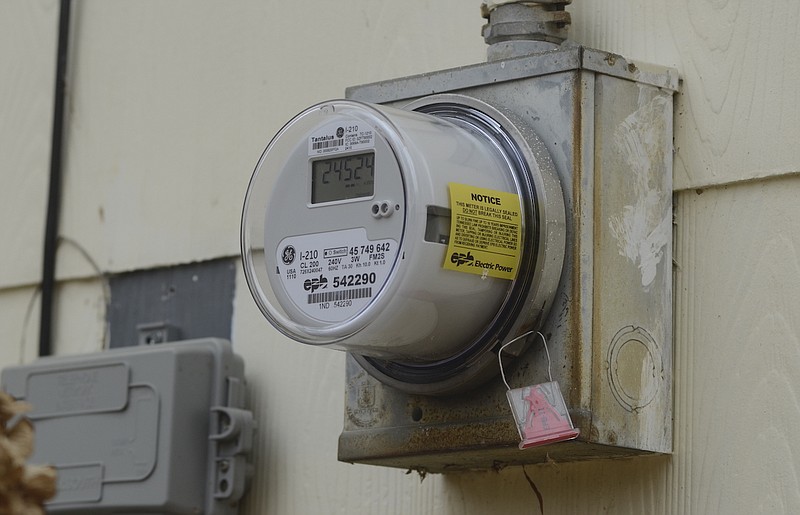Chattanooga motorists may be benefiting from the recent drop in gasoline prices, but homeowners should brace themselves for higher energy bills at home this winter.
The price of electricity will increase again next month and be up by more than 11% from a year ago in Chattanooga during October, according to EPB. A new forecast by the U.S. Energy Information Administration last week predicts electric rates nationwide will continue to increase in 2023 after rising an average 7.5% this year.
Russia's invasion of Ukraine and a surge of U.S. exports to energy-starved Europe cut off from most Russian oil and gas supplies are driving up the price of natural gas -- the major power source for generating electricity, according to a new government report.
The Tennessee Valley Authority is increasing its fuel cost adjustment again in October to a rate nearly double the average price for fuel in the same month over the previous three years. TVA is keeping its base rates constant for the fourth consecutive year when fiscal 2023 begins on Oct. 1, but the federal utility adjusts a portion of its power charges each month based on the changing cost of fuel needed to generate or purchase electricity sold in TVA's seven-state service territory.
"Natural gas, purchased power and coal rates remain much higher than the three-year average rates, and volatility is still prevalent, especially in natural gas pricing," TVA spokesman Scott Brooks said via email. "The October fuel rate is only slightly higher than the September fuel cost, and 90% higher than the three-year average."
The power portfolio for the Tennessee Valley Authority, which supplies electricity to EPB and 152 other municipalities and power cooperatives, includes 26% from natural gas and 19% from coal. In previous years, higher natural gas would cause power companies to switch to cheaper but dirtier coal, but TVA and other utilities have shut down much of the coal generating capacity they once had as they move toward more carbon-free generation to reduce the emission of greenhouse gases.
Natural gas prices remain elevated even though the average price of gasoline for Chattanooga motorists has dropped by more than $1.50 a gallon from the peak reached in June, according to Gasbuddy.com.
Brooks said higher projected electricity usage is also contributing to the higher fuel rate as sales are expected to be 7% higher than the three-year average.
For the typical Chattanooga household that uses 1,295 kilowatt-hours of electricity a month, the higher fuel adjustment next month will add another $1.33 to the typical bill. October power bills for such a household will be $14.11 higher than what was charged a year earlier.
But compared with the recent hot summer months or the colder winter months ahead, most homeowners should still benefit by milder temperatures during October to be able to reduce the use of either electric air conditioners or electric furnaces.
"We are hopeful milder weather during the fall will moderate electricity usage as customers are more likely to use less energy during fall months," EPB spokeswoman Sophie Moore said in an emailed statement. "We encourage customers to request a complimentary phone consultation with EPB Energy Pros to address questions or concerns about lowering their energy bills by making their homes more efficient and comfortable. EPB Energy Pros are also available to visit homes at no charge to perform Home Energy Check-Ups, thorough in-person analyses that conclude with recommendations tailored to customer needs."
TVA residential electric rates remain below more than 70% of U.S. utilities, and the price increases this winter for electricity are expected to be less than for natural gas used to heat some homes and businesses.
The Energy Information Administration forecasts that U.S. residential electricity prices will average about 15.24 cents per kilowatt-hour in 2023, up from 14.75 cents per kilowatt-hour this year and 13.72 cents per kilowatt-hour in 2021. If the administration's 2023 forecast is accurate, that would indicate an almost 16% increase in electricity prices from 2019 to 2023.
"These are very high prices and will not be affordable for many households," Mark Wolfe, executive director of the National Energy Assistance Directors Association, said in a statement last week.
The association represents state directors of the federal government's Low Income Home Energy Assistance Program. The association estimates U.S. families have about $16 billion in utility debt, up from $8.1 billion at the end of 2019. The average amount owed rose from about $403 to $792 per customer, the association said.
Contact Dave Flessner at dflessner@timesfreepress.com or at 423-757-6340. Follow him on Twitter at @Dflessner1.
